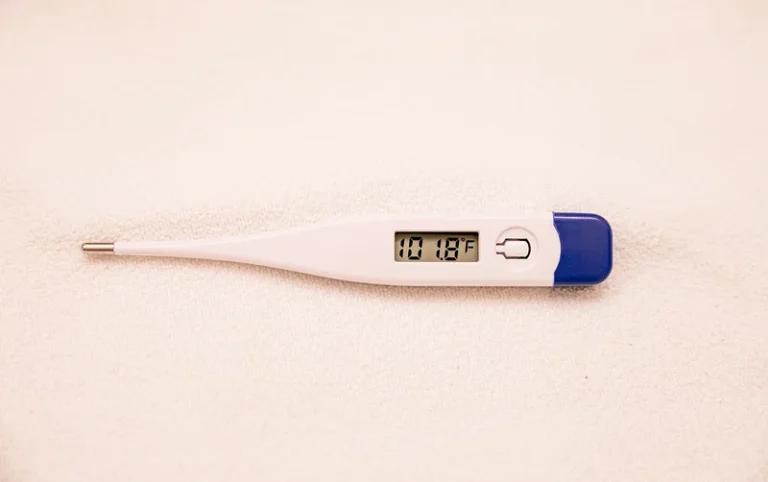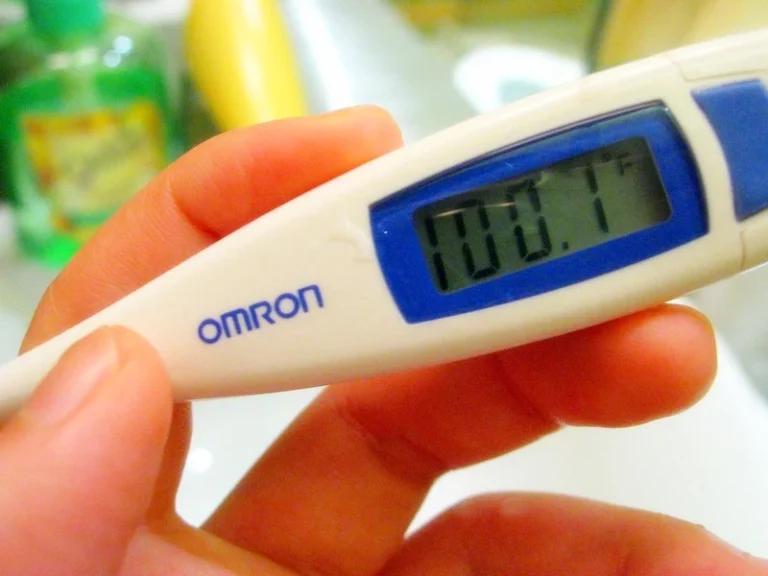
As a parent, dealing with a child’s fever can be a nerve-wracking experience. The sight of a high temperature can instantly trigger alarm bells, leaving you wondering if it’s a cause for concern or simply a normal part of your little one’s immune system at work. Many things can cause a high temperature in children, from common childhood illnesses like ear infections, chickenpox and tonsillitis, to vaccinations. Fortunately, with the right knowledge and guidance, you can navigate these worrying episodes with confidence, ensuring your child’s health and well-being.
In this guide, we’ll look into the details of childhood fevers, exploring when a fever should raise red flags and when it can be safely managed at home, so you’ll be better equipped to make informed decisions and provide the best care for your child.
Understanding fever basics
What is a fever?
A fever is defined as an abnormally high body temperature, typically above the standard 98.6°F (37°C) mark. However, it’s important to note that “normal” body temperature can vary slightly from child to child and may fluctuate throughout the day. The type of thermometer used can also influence the threshold for what is considered a fever.
Thermometer types and temperature thresholds
When it comes to accurately measuring a child’s temperature, there are several thermometer options to choose from, each with its advantages and recommended temperature ranges. The most accurate method is a rectal thermometer for infants and young children, followed by oral and ear (tympanic) thermometers for older children. Armpit thermometers, while convenient, tend to be less precise.
Here’s a breakdown of the temperature thresholds for fever in children in different age groups and thermometer types:
TABLE TO BE ADDED HERE
It’s important to note that these thresholds are general guidelines, and your child’s normal temperature may vary slightly. Always consult with your pediatrician if you have any concerns about your child’s temperature reading.
The purpose of fever
Contrary to popular belief, a fever is not the illness itself, but rather a natural response of the body’s immune system to fight off an infection. When the body detects an invading pathogen, it raises its internal temperature to create an inhospitable environment for the germs, making it harder for them to thrive. Most fevers in children are caused by viral infections, and some are caused by bacterial infections.
In most cases, a mild to moderate fever is a sign that the body is doing its job and should not be suppressed unless the child is experiencing significant discomfort or distress. Fevers typically resolve within 1 to 4 days as the body successfully battles the underlying infection.
When to worry about a fever
While fevers are a common occurrence in children, there are certain situations where a fever may require immediate medical attention. Parents must know these red flags and when to seek professional help.
Fevers in infants under 3 months
Infants under 3 months of age are particularly vulnerable, and any fever, regardless of the temperature reading, should be addressed promptly. Newborns may have a limited ability to communicate their symptoms, and a fever could be the only indication of a serious illness. In these cases, it’s essential to contact your pediatrician or seek emergency medical help immediately.
High fevers in older infants and children
For children over 3 months of age, a fever above 104°F (40°C) is considered a high fever and may require medical intervention. If your child’s temperature does not respond to medications or remains elevated for more than 5 days, it’s crucial to consult with your healthcare provider to determine the underlying cause and receive appropriate treatment.
Fevers accompanied by concerning symptoms
In addition to the temperature itself, it’s important to monitor your child’s overall behaviour and well-being. If your child exhibits any of the following signs, it’s advisable to seek medical attention:
- Difficulty waking or staying alert
- Reduced fluid intake or decreased urination
- Rash that does not fade when pressed
- Stiff neck
- Severe headache or abdominal pain
- Persistent vomiting or diarrhoea
- Unusual irritability or agitation
These symptoms may indicate a more serious health condition that requires prompt medical evaluation.
Febrile seizures
In some cases, a fever can trigger a febrile seizure, which is a temporary and involuntary shaking or convulsing of the body. While frightening to witness, febrile seizures are generally not life-threatening and do not necessarily indicate a severe illness. However, if a seizure lasts longer than 5 minutes or your child does not regain consciousness, it’s crucial to call emergency services immediately.
Managing fevers at home
For most mild to moderate fevers that do not raise immediate concerns, you can safely manage your child’s condition at home with a few simple steps.
Keeping your child comfortable
Avoid wrapping your child in too many layers or using cold baths or sponges to lower the temperature. Instead, dress them in lightweight, comfortable clothing and maintain a cool, well-ventilated environment. Offer plenty of fluids to prevent dehydration, and provide medications like acetaminophen/paracetamol or ibuprofen if your child is experiencing discomfort.
Monitoring and adjusting care
Regularly check your child’s temperature and observe their behaviour. If the fever persists for more than 5 days or does not respond to medications, it’s important to consult a healthcare professional. Additionally, if your child exhibits any concerning symptoms, such as difficulty breathing, excessive drowsiness, or a persistent rash, seek medical attention promptly.
Knowing when to call the doctor
While many fevers can be managed at home, there are certain situations where it’s crucial to seek medical advice. Seek medical help if your child:
- Is under 3 months old and has a temperature of 100.4°F (38°C) or higher
- Is 3 to 6 months old and has a temperature of 101°F (39°C) or higher
- Has a fever that lasts for more than 5 days
- Appears dehydrated or is not urinating regularly
- Exhibits a rash, stiff neck, or other concerning symptoms
Your doctor can help determine the underlying cause of the fever, provide appropriate treatment, and offer guidance on managing your child’s condition.
Understanding the risks
Febrile seizures, or seizures triggered by a fever, are a concerning but relatively common occurrence in young children. These episodes can be frightening for parents, but it’s important to understand that they are usually not a sign of a serious underlying condition.
Febrile seizures typically occur in children between 6 months and 5 years of age, with the peak incidence between 12 and 18 months. While the exact cause is not fully understood, it’s believed that the rapid rise in body temperature can disrupt the normal electrical activity in the brain, leading to the seizure.
Febrile seizures are generally not life-threatening and do not cause long-term neurological damage. However, if a seizure lasts longer than 5 minutes or your child does not regain consciousness, it’s crucial to call emergency services immediately.
Preventing and reducing fever
While fevers are often unavoidable, there are steps you can take to help prevent and manage them effectively.
Promoting a healthy immune system
Maintaining a balanced diet, ensuring adequate sleep, and encouraging physical activity can all contribute to a stronger immune system, making your child less susceptible to infections that may trigger fevers. Additionally, staying up-to-date with recommended vaccinations can significantly reduce the risk of certain illnesses.
Fever management
When your child does develop a fever, providing medications, keeping them hydrated, and maintaining a comfortable environment can help alleviate their discomfort and support their recovery. Remember to always follow the pediatric dosage instructions and consult your paediatrician if you have any concerns.
Preventing dehydration
Fever can lead to increased fluid loss, so it’s crucial to encourage your child to drink plenty of fluids, such as water, electrolyte-rich drinks, or diluted juices. Avoid sugary drinks, as they may worsen dehydration. If your child is refusing to drink or showing signs of dehydration, seek medical advice immediately.
Conclusion
Navigating childhood fevers can be a daunting task for parents, but with the right knowledge and guidance, you can ensure your child’s health and well-being. Remember, not all fevers require immediate medical intervention, and understanding the appropriate temperature thresholds, monitoring your child’s symptoms, and seeking professional help when necessary can go a long way in providing the best care.
Sources
- When to Worry About a Child’s Fever
- High temperature (fever) in children – NHS
- Fever – fever medication- fever – temperature – thermometer
Medical Disclaimer
NowPatient has taken all reasonable steps to ensure that all material is factually accurate, complete, and current. However, the knowledge and experience of a qualified healthcare professional should always be sought after instead of using the information on this page. Before taking any drug, you should always speak to your doctor or another qualified healthcare provider.
The information provided here about medications is subject to change and is not meant to include all uses, precautions, warnings, directions, drug interactions, allergic reactions, or negative effects. The absence of warnings or other information for a particular medication does not imply that the medication or medication combination is appropriate for all patients or for all possible purposes.







